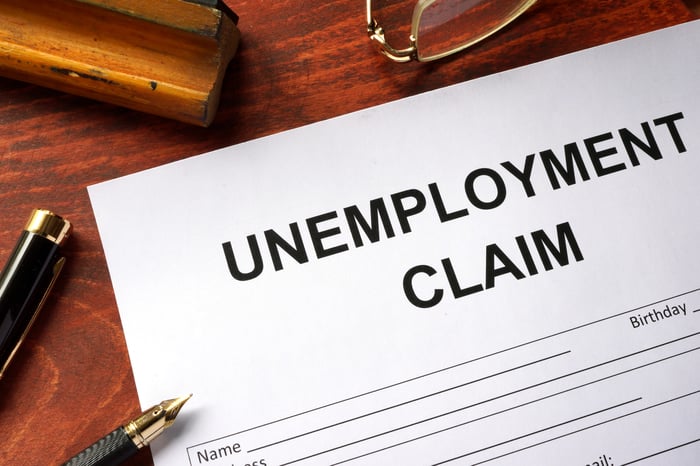Millions of Americans have been left jobless in the wake of COVID-19. In late March, the CARES Act was put into effect and allowed for a $600 weekly boost to unemployment benefits through the end of July. But now that that extra money is gone, a lot of people have been left struggling to keep up with their basic expenses.
Lawmakers have been duking it out on a second COVID-19 relief package, and one aspect they can't seem to agree on is unemployment. Once it became clear that a second deal was not about to be signed into law, President Trump signed an executive order calling for a $400 weekly boost to unemployment. That boost will, in practice, only amount to $300 in most states, since only $300 of it comes from the federal government, and most states don't have room in their budgets to cover the remaining $100.

Image source: Getty Images.
Of course, an extra $300 a week is better than nothing. But unfortunately, it could take weeks, if not longer, before that extra money actually starts to land in Americans' pockets.
When can the jobless expect their unemployment boost?
President Trump's $300 weekly boost will come in the form of a FEMA grant, and states will need to apply for it in order for residents to collect that money. But states can't just tack those benefits onto their current unemployment benefits. Rather, they'll need to reconfigure their systems to distribute that money, and that process could take weeks, if not longer, especially given that many unemployment systems run on archaic software. That's bad news for anyone who's already struggling to hang on financially.
Now for the good news. Once states are set up, unemployed residents will be eligible for their $300 weekly boost retroactive to August 1. As such, delays in getting that money out won't cause jobless people to lose it; they'll just need to wait longer to get it. But that scenario alone could drive millions into costly debt.
Additionally, not every unemployed worker will be eligible for that $300 weekly boost. Specifically, those who currently receive less than $100 a week in state unemployment benefits will be not entitled to that extra money. (If that sounds counterintuitive, you're not alone. You'd think that those getting the least amount of unemployment would need that extra $300 the most.) More than three dozen states have a minimum weekly unemployment benefit that falls below $100, so a lot of workers are at risk of losing out on this new funding.
Another problem with the president's proposal is that the boosted unemployment benefits it calls for may end up being very short-lived. States will initially be guaranteed three weeks of FEMA funding, but beyond that, there's no guarantee of getting more -- especially since they'll be pulling from the same pool of money used to respond to natural disasters, like hurricanes.
All told, jobless Americans are in a pretty precarious spot right now, and the longer it takes to get them their extra money, the more our entire economy stands to suffer. Right now, our economy is stuck in a recession, and without adequate income, the jobless are apt to start cutting back on spending in a very meaningful way. Getting more money into their hands is essential to fueling our entire recovery, but there doesn't seem to be a good solution for expediting things.




